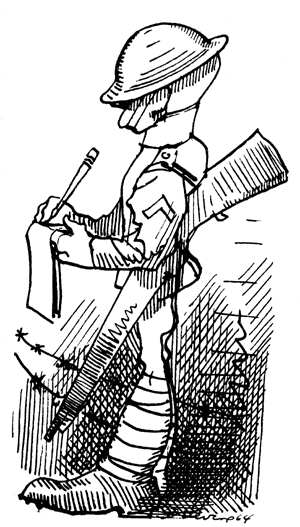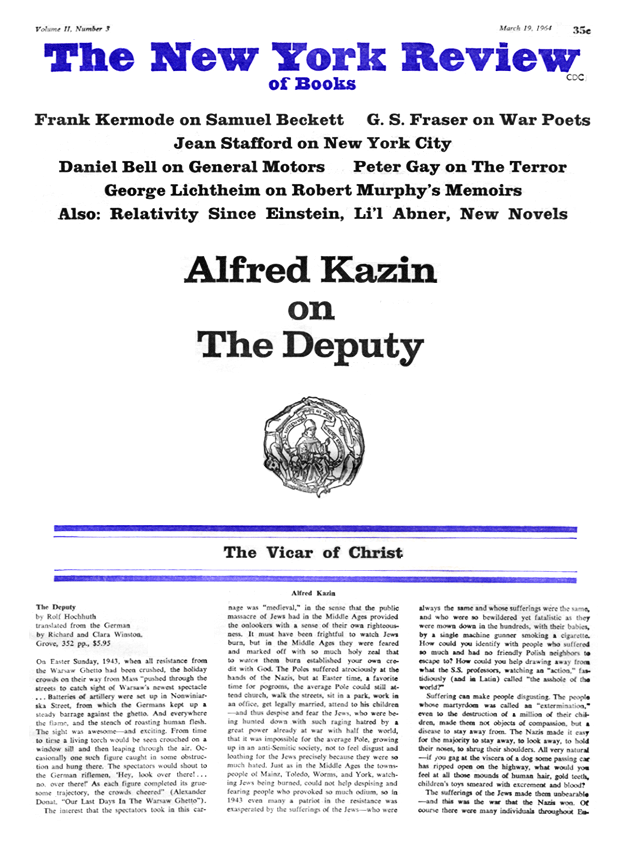Military memories all read alike. Was there ever a general who did not spend most of his time fighting his rivals? The reminiscences of retired ambassadors also tend to have a family likeness. There ought to be—perhaps there is—a Ph.D. thesis on the subject. If it doesn’t exist, I am ready to give instructions on how to write it. It should begin by stressing the importance of the persona. Ambassadors, like admirals, have to cultivate an official personality. They must be patient, tactful, imperturbable. The ideal diplomat is the man who, told that the world is coming to an end, replies that he will draft a report on the matter. Above all, he must remember that diplomats are government officials, not philosophers or philanthropists. Duty and sentiment run in separate grooves; feelings must be kept under control. The execution of policy may be questioned—its purpose never. All government rests on such loyalties. Without them the machine would come to a stop.
Mr. Robert Murphy runs true to form. Americans, one is told, are suspicious of diplomats as being clever fellows, always up to no good; else cynical expatriates, contemptuous of the simple folks back home. Mr. Murphy’s memoirs should reassure them. No one reading his book could mistake him for anything but a good citizen, a sound patriot, and a competent, hardworking, slightly unimaginative public servant. His background—Midwestern, Irish-German, lower-middle-class—is reassuring. His viewpoint is moderately conservative. His moral values—firmly held but not obtruded—are those of decent church-going people anywhere. His prose, if undistinguished, is serviceable and appears to be his own. His career was exemplary: The son of poor parents, he rose by merit, and (though he does not say so) it is clear that he worked a lot harder than some of his official superiors. In time he reached the top: From chargé d’affaires in Vichy he moved on to become Roosevelt’s special representative in North Africa, a participant at the Potsdam conference in 1945, Ambassador to Japan during the Korean war. He met De Gaulle, Churchill, Stalin, advised on Berlin, took a hand in shaping post-war policy under Dulles, and dealt with all the local potentates from Nasser to Tito. When in 1959 he retired from the service he had entered as a junior official in 1917, he had risen to eminence, and so had his country: The government clerk from Milwaukee had become the representative of a world power. Had it changed him? Not much. The tone remains the same throughout, and so, it appears, did the sentiments. At seventy he looks back content. He has served his country well, and what more is there to be said?
To a European, the interest of these memoirs lies in their revelation of how America’s involvement in Europe over the past half century has shaped itself. Mr. Robert Murphy served in Switzerland during the First World War, and most of his official career was linked with France and Germany. Between 1921 and 1925 he held a consular post in Munich. It is to his credit that he noticed Hitler’s importance and drew his superiors’ attention to him; also that in later years he tried to intervene on behalf of Jewish acquaintances. Otherwise the record of these years is unrevealing. His perceptions are conventional: Bavaria was “conservative” and disliked the Weimar Republic; inflation ruined the middle class and facilitated Hitler’s rise; the Nazis were noisy and potentially dangerous, though Communism was even more of a menace. All this, one may suppose, was the standard fare of embassies and intelligence services; it probably still is.
From 1930 to 1940 Mr. Murphy served at the U.S. Embassy in Paris, mostly in a key political post. These were the years when the Third Republic failed to solve its problems and parliamentary government was deadlocked. The American Embassy (for much of the time headed by Ambassador Bullitt) became a rendezvous of worried French statesmen, and of some who were not yet statesmen, but hoping to get there. Mr. Murphy met them all, including the Communists, sympathized with their problems and improved his already fluent French by talking to them. In time he formed the opinion (which was also held by his chief) that France was in a had way and no match for Germany, even if helped by Britain. This pessimism, widespread throughout French society, became very marked when war was declared in 1939. While the country sullenly endured the burden, the politicians laid siege to the American Ambassador: Was the United States going to come in? Bullitt did his best to explain that Roosevelt had his hands tied by Congress, and Mr. Murphy faithfully records the bleak atmosphere of the “phony” winter before the German blow fell. His chapters on the 1940 debacle, and the madhouse atmosphere in Vichy, are graphic and convey some sense of what happens when a political system suddenly falls to pieces. In his analysis of the causes he is once more conventional. He duly lists the usual conservative complaints: instability, moral corruption, the unpopularity of Léon Blum. There is a bare side-glance at Munich (of which presumably he approved) and an equally brief reference to the Spanish Civil War, the tone of which suggests that he sympathized with Franco. He makes a little too much of the Communist “fifth column” in 1939/40. It is true that, after the Hitler-Stalin pact had been signed, the Communists did what they could do to sabotage the French war effort; it is also true that there was not a great deal to sabotage. De Gaulle (of whom the author had not heard prior to his emergence in 1940) in his memoirs has less to say about the Communists, and more about official incompetence and inertia. But then Mr. Murphy’s contacts were with Pétain and Weygand, and they naturally saw themselves in a different light.
Advertisement
North Africa provides the high point of the memoirs. Their author then held a key position, and for a couple of years was Roosevelt’s chosen instrument in extending American influence to the Mediterranean and preparing for the invasion of Italy and France. To his British colleague Richard Crossman (who advised Macmillan on “political warfare”) he was “poor harmless Bob Murphy” His own account suggests that, though no Talleyrand, he was perhaps not quite so ineffective as that. His account of the rather murky dealings which preceded the Allied landing in North Africa does not add much to what is already known, but it does help to fill out the picture. He offers a reasonable defense of Washington’s attitude toward people like Darlan, whose help was badly needed at the time and who were really more anti-British than pro-German; throws some amusing sidelights on the blundering behavior of assorted military and political dignitaries; and does his best with the official American policy of trying to groom the imbecile donkey Giraud as Roosevelt’s future Proconsul in France: as against the dangerously intelligent and independent De Gaulle, who clearly did not intend to become anyone’s instrument.
At this point Mr. Murphy’s ingenuity leaves him in the lurch, or perhaps his native honesty gets the better of his discretion. At any rate he is quite candid about Roosevelt’s plans (in 1943) for doing away with the French empire in Africa and Asia, transferring control of Dakar (presumably to the United States), drawing Morocco into the American economic sphere (this last was proposed by Roosevelt to the Sultan in the presence of high French officials!), and installing “safe” Frenchmen in France itself. De Gaulle watched all this and naturally did not like it. Mr Murphy complains about the treatment he gets in De Gaulle’s memoirs: notably the insinuation that his only French contacts were wealthy Vichy sympathizers. But his own account does indicate that he knew little, and cared less, about the Resistance movement, apart from those attentistes (mostly high officials of soundly conservative views) who took the line that nothing should be done until it had become safe, i.e., until the Allies had actually landed. He gives credit to these Pétainists for being sincere patriots according to their lights. What he fails to see is that they served as a respectable front for a regime which was steadily turning France into a replica of the Hitler cloaca. His blind spot on this subject also prevents him from realizing that De Gaulle was able to eliminate Giraud not just because he was more intelligent, but because he had the backing of the Resistance movement—the real one: The handful of men and women who went on fighting after 1940, and thus saved their country’s honor when its so-called leaders had capitulated.
After this high point the rest of the story is anticlimactic, but there are some nice personal touches. At Potsdam in July 1945, after Churchill had gone home (having been defeated in the elections), Stalin visibly lost interest and made it clear that he regarded the proceedings as a waste of time. Attlee, who took Churchill’s place for the remainder of the conference, managed to say nothing for four whole days: a feat Mr. Murphy charitably (or diplomatically) ascribes to modesty. The American delegation, for security reasons, refused to admit stenographers, and had to get its transcript of the proceedings from the British Foreign Office. Truman, presiding over Churchill and Stalin (De Gaulle had not been asked), felt uncomfortable in the presence of these fabulous monsters, complained about them to his associates, and vowed never to attend another international conference—a resolve to which he stuck. He had come to Potsdam armed with a world-saving scheme of his own: control of international waterways including the Panama Canal). To the embarrassment of the U.S. delegation he insisted on delivering a lengthy statement on the subject. He had come to the conclusion, he said, that all major wars of the previous two centuries had originated in the area from the Black Sea to the Baltic, and from the eastern frontier of France to the western frontier of Russia. He “did not want to become involved in another war over the Dardanelles, or the Danube, or the Rhine. It should be the business of this conference, and of the coming Peace Conference, to remove this source of conflict.” Everyone was embarrassed. Churchill expressed cordial support in general terms. Stalin merely said he would read the President’s paper. Mr. Truman brought the matter up again, and in the end made a lengthy personal appeal to Stalin (Churchill had gone home). Before the interpreter had finished translating, Stalin said Nyet and then to everyone’s surprise, added in English: “I say no!” Tableau! Stalin knew English! Everyone present had something new to cable home. Of such is the kingdom of diplomacy. Mr. Murphy has written a remarkably candid, informative, and even-tempered book, and if he never quite rises above the conventional level, no blame attaches to him. By the usual standards of his profession (the second oldest in the world) he is to be counted among the righteous.
Advertisement
This Issue
March 19, 1964



